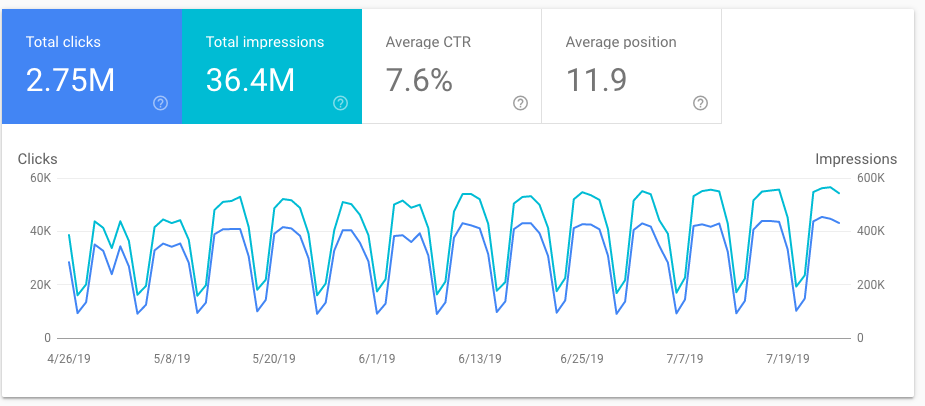|
|
Sponsored Content
The Lounge
What is on Your Mind?
UNIX.com is getting crushed in google search these days
Post 303037275 by Neo on Sunday 28th of July 2019 10:57:36 AM
|
|
6 More Discussions You Might Find Interesting
1. Shell Programming and Scripting
This little doey allows you do fire up a google search right from your terminal.
---------------------------------------------------
#!/bin/sh
#(save me into the path as "google")
clear &&
for i in "$@";
do lynx http://www.google.com/search?q="$@";
done
... (3 Replies)
Discussion started by: JoeTheGuy
3 Replies
2. Web Development
Please let me know if Google search appliance supports JSON or XML interface? If yes please provide some references (3 Replies)
Discussion started by: uunniixx
3 Replies
3. What is on Your Mind?
Hi Unix Gurus,
In my Co. we have intranet site hosted on Unix box. In Explorer there is a text box for searching information on internet. By default it is using Google Custom Search. This search engine is little old one. Now I want to patch this search engine with latest patch. If any one know... (0 Replies)
Discussion started by: sriramis4u
0 Replies
4. What is on Your Mind?
Have just added (after missing for some time), the latest version of Google Site Search for our site in the Navbar Search Menu:
https://www.unix.com/members/1-albums215-picture791.png
Cheers and Enjoy.
Here is the URL for that link in case you need it:
https://goo.gl/P8p82c (4 Replies)
Discussion started by: Neo
4 Replies
5. What is on Your Mind?
Some search results for the keyword "unix" searches:
DuckDuckGo #1
https://www.unix.com/members/1-albums215-picture1254.png
Bing #2
https://www.unix.com/members/1-albums215-picture1253.png
Google #15 (page 2)
https://www.unix.com/members/1-albums215-picture1252.png (1 Reply)
Discussion started by: Neo
1 Replies
6. What is on Your Mind?
Getting a bit more comfortable making quick YT videos in 4K, here is:
Search Engine Optimization | How To Fix Soft 404 Errors and A.I. Tales from Google Search Console
https://youtu.be/I6b9T2qcqFo (0 Replies)
Discussion started by: Neo
0 Replies
LEARN ABOUT DEBIAN
xcalpr
XCALPR(1) General Commands Manual XCALPR(1) NAME
xcalpr - print xcal calendar entries SYNTAX
xcalpr [ -c ][ -x ][ -f file ][ -d dir ][ -u user ][ date-spec ] DESCRIPTION
Xcalpr prints the contents of the xcal files. It is intended to be used in situations when you have no access to an X screen. It can also be used to generate entries for the standard UNIX calendar program. With no arguments, it prints any entries that exist for the next seven days. The program also reads the contents of the seven daily files and prints them at the appropriate point in the output stream. Each line in the output is preceded by the day of the week, the day of the month, the month and the year. Xcalpr can be given a date specification to select months and years. If the date spec consists of just a year number, then all the data for that year is printed. For example: xcalpr 1994 will print all the data for 1994. Several years can be specified. If you give the name of a month, then the data for that month in the current year will be printed. If the month is in the past, then the data for that month next year will be printed. For example, if xcalpr oct jan is typed in August, xcalpr will print October in the current year and January next year. You can select a particular year by adding the number after any months that you need printing: xcalpr oct nov 1994 will print October and November in 1994. There are a couple of special `month' names. The name rest will print the data for the rest of the month, starting tomorrow. The rest argument is not recognised if you give a year as a parameter. If tomorrow happens to be the first day of the next month, then all the data for next month will be printed. The name next prints all the data for next month. OPTIONS
The -c option causes xcalpr to output lines suitable for input to the standard UNIX calendar program. The -d switch is followed by a directory name and specifies an alterative location for your Calendar directory. Your home directory is prepended if the name doesn't start with a slash or a dot. The -f option is followed by a file name and xcalpr will write it's output to that file, rather than standard output. The -u option is followed by a user name and dumps their calendar files rather than yours. The -x option makes xcalev operate with Calendar files that are compatible with the xcalendar program. FILES
$HOME/Calendar/* xc<dd><Mon><Year> A data file is day, Month in three letter format and the year. xy<Year> A year directory. xw<Day> A data file for the weekly code, one per day. SEE ALSO
xcal(1), xcalev(1), xcal_cal(1) AUTHOR
Copyright 1993 by Peter Collinson, Hillside Systems All rights reserved. This product includes software developed by the University of California, Berkeley and its contributors. X Version 11 R5 October 1993 XCALPR(1)
